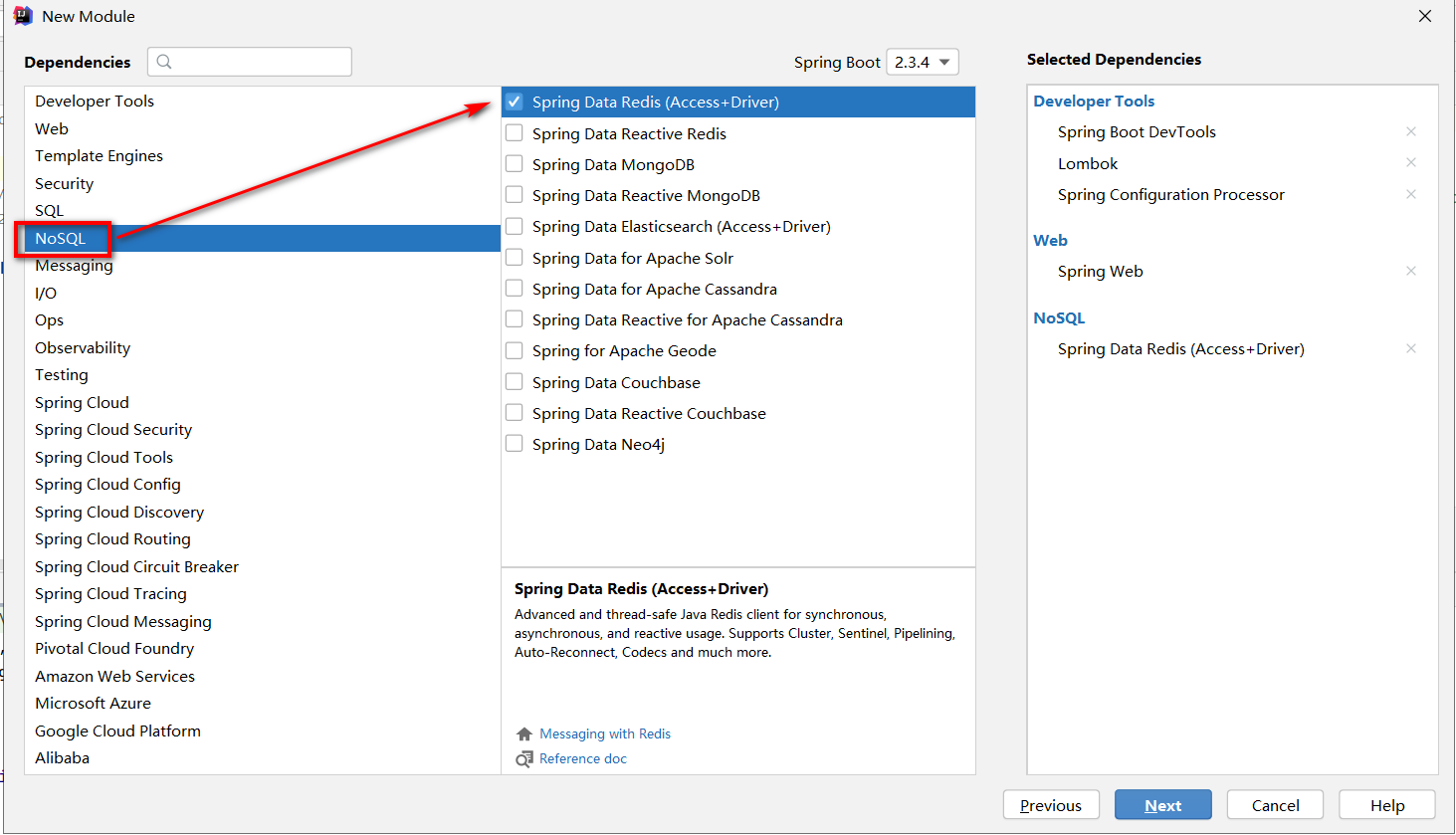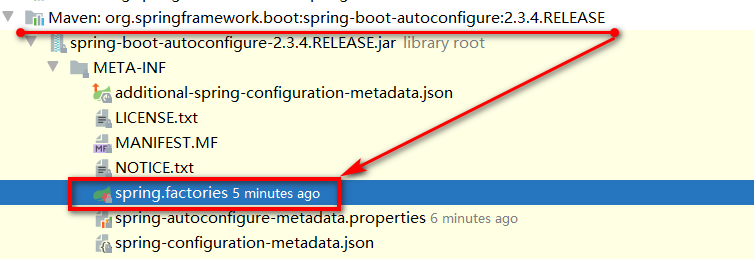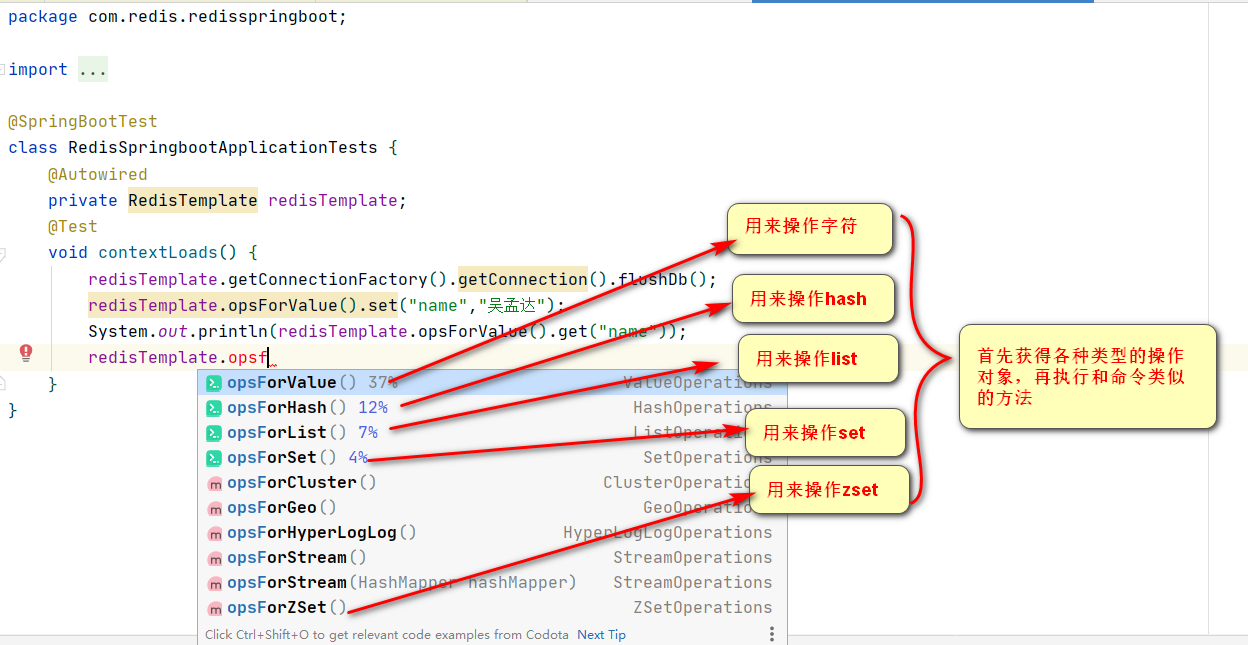11.springboot对reids的支持
1.集成springdata中的redis模块

2.说明
springboot2.x之后,原底层操作redis使用的是jedis,被替换成了lettuce
为什么呢?
jedis:采用的是直连,多个线程操作的话,是不安全的,如果想要避免不安全,使用jedis pool连接池!其模式更像BIO模式
lettcue:采用的是netty框架,实例可以在多个线程中进行共享,不存在线程不安全的情况!可以减少线程,更像NIO模式3.怎么知道springboot集成redis需要怎么连接或者配置什么呢
3.1springboot的自动配置:找到该文件,这个文件记录了springboot自动配置的所有组件

3.2源码分析
1.里面的redis内容如下:
。。。
org.springframework.boot.autoconfigure.data.redis.RedisAutoConfiguration,\(redis的自动配置)
org.springframework.boot.autoconfigure.data.redis.RedisReactiveAutoConfiguration,\
org.springframework.boot.autoconfigure.data.redis.RedisRepositoriesAutoConfiguration,\
。。。
2.找到第一行redis的自动配置类:
@Configuration(proxyBeanMethods = false)
@ConditionalOnClass(RedisOperations.class)
@EnableConfigurationProperties(RedisProperties.class)----->redis的自动配置属性都是从这个类的属性中获取的!
@Import({ LettuceConnectionConfiguration.class, JedisConnectionConfiguration.class })
public class RedisAutoConfiguration {
@Bean
@ConditionalOnMissingBean(name = "redisTemplate")(当容器中没有redisTemplate这个bean的时候才会生效,等于说我们可以自己写一个redisTemplate组件替换它!)
public RedisTemplate<Object, Object> redisTemplate(RedisConnectionFactory redisConnectionFactory)
throws UnknownHostException {
//默认redisTemplate没有做太多的设置,redis对象都是需要序列化的
//两个泛型都是object,我们知道reids的key都是string的,所以需要强转为RedisTemplate<Strring, Object>
RedisTemplate<Object, Object> template = new RedisTemplate<>();
template.setConnectionFactory(redisConnectionFactory);
return template;
}
@Bean
@ConditionalOnMissingBean//String是redis中最常用的,所以单独提出来一个bean
public StringRedisTemplate stringRedisTemplate(RedisConnectionFactory redisConnectionFactory)
throws UnknownHostException {
StringRedisTemplate template = new StringRedisTemplate();
template.setConnectionFactory(redisConnectionFactory);
return template;
}
}
3.RedisProperties类中的属性有:这些属性都是可以在springboot的配置文件中进行重写的
*/
@ConfigurationProperties(prefix = "spring.redis")
public class RedisProperties {
private int database = 0;
private String url;
private String host = "localhost";
private String password;
private int port = 6379;
private boolean ssl;
private Duration timeout;
private String clientName;
private Sentinel sentinel;
private Cluster cluster;
..
}
4.springboot对redis的使用
4.1在springboot的application.properties配置redis相关信息
spring.redis.host=192.168.2.128
spring.redis.port=6379
4.2对应的测试类:
@SpringBootTest
class RedisSpringbootApplicationTests {
//注入redisTemplate的依赖,并通过它来操作redis
@Autowired
private RedisTemplate redisTemplate;
@Test
void contextLoads() {
//获取redis连接来清空
redisTemplate.getConnectionFactory().getConnection().flushDb();
//opsForValue用来操作字符串
redisTemplate.opsForValue().set("name","吴孟达");
System.out.println(redisTemplate.opsForValue().get("name"));--->可正确输出吴孟达
}
}
执行完上述代码后,在linux服务器上执行:
127.0.0.1:6379> keys *
1) "\xac\xed\x00\x05t\x00\x04name"(发现前面有部分乱码,这是因为redis里的对象是需要序列化的,不能直接放入redis)自己编写redisTemplate(存储在redis上的数据必须序列化-->默认采用的是jdk的序列化,需要重写下,改为:key使用StringRedisSerializer的序列化,value采用Jackson2JsonRedisSerializer序列化)
1.编写一个自己的配置类:
@Configuration
public class RedisConfig {
@Bean(方法名必须是:redisTemplate,由源码得知,当容器中有redisTemplate时,底层的redisTemplate会不起作用)
public RedisTemplate<String, Object> redisTemplate(RedisConnectionFactory factory){
//为了自己开发方便,我们一般使用<String, Object>
RedisTemplate<String, Object> template=new RedisTemplate<>();
template.setConnectionFactory(factory);
//json序列化
Jackson2JsonRedisSerializer jackson2JsonRedisSerializer=new Jackson2JsonRedisSerializer(Object.class);
ObjectMapper om=new ObjectMapper();
om.setVisibility(PropertyAccessor.ALL, JsonAutoDetect.Visibility.ANY);
om.enableDefaultTyping(ObjectMapper.DefaultTyping.NON_FINAL);
//String序列化设置
StringRedisSerializer stringRedisSerializer=new StringRedisSerializer();
//key采用string的序列化
template.setKeySerializer(stringRedisSerializer);
//hash的可以也采用string序列化
template.setHashKeySerializer(stringRedisSerializer);
//value采用jackson
template.setValueSerializer(jackson2JsonRedisSerializer);
//hash的value序列化采用jackson
template.setHashValueSerializer(jackson2JsonRedisSerializer);
template.afterPropertiesSet();
return template;
}
}
2.实体类实现序列化:这里使用了:lombk
说明:lombok插件的作用是使用注解代替了繁琐的get/set方法等,但是弊端是:团队开发时,所有人都得安装lombok插件,要不彼此间有方法调用时,可能会报方法找不到错误
使用步骤:
1.idea安装lombok插件
2.项目导入lombk的jar包:
<dependency>
<groupId>org.projectlombok</groupId>
<artifactId>lombok</artifactId>
<optional>true</optional>
</dependency>
实体类如下
@Component
@Data(注解在类上,将类提供的所有属性都添加get、set方法,并添加、equals、canEquals、hashCode、toString方法)
@AllArgsConstructor(创建一个全参构造函数)
@NoArgsConstructor(创建一个无参构造函数)
public class Person /*implements Serializable*/ {
private String name;
private Integer age;
}
3.测试:
@SpringBootTest
class RedisSpringbootApplicationTests {
@Autowired
@Qualifier("redisTemplate")--->确保这里使用的是自己重写的redisTemplate
private RedisTemplate redisTemplate;
@Test
public void test(){
redisTemplate.getConnectionFactory().getConnection().flushDb();
Person person=new Person("吴孟达",18);--->可以直接创建对象
redisTemplate.opsForValue().set("user",person);-->将新建的对象直接放入redis中,按照redisTemplate序列化,value会使用jackson序列化
System.out.println(redisTemplate.opsForValue().get("user"));
//此处正常输出:{"name":"吴孟达","age":18}
}
}
4.服务器上
1.采用redis-cli命令登录redis时
127.0.0.1:6379> keys *
1) "user"
127.0.0.1:6379> get user
"{\"name\":\"\xe5\x90\xb4\xe5\xad\x9f\xe8\xbe\xbe\",\"age\":18}"(发现值为16进制数)
2.解决上述问题:
采用:redis-cli --raw命令登录
root@cd8a28bf1a1c:/data# redis-cli --raw
127.0.0.1:6379> keys *
user
127.0.0.1:6379> get user
{"name":"吴孟达","age":18}(可正常输出)一般我们也不会直接使用redisTemplate原生api去操作reids,而是会封装一个工具类(下面工具类可以直接使用)
该工具类中封装了大量的redis操作,可以直接复制过去直接用,若没有想要的操作,再新增即可,这样不用每次都使用:redisTemplate.opsxxx().方法
@Component
public class RedisUtil {
@Autowired
private RedisTemplate<String, Object> redisTemplate;
/**
*指定缓存失效时间
* @param key 建
* @param time 保存时间(秒)
* @return
*/
public boolean expire(String key,long time){
try {
if (time>0){
redisTemplate.expire(key,time, TimeUnit.SECONDS);
}
return true;
} catch (Exception e) {
e.printStackTrace();
return false;
}
}
/**
* 获取建的缓存时间
* @param key:建,不能为null
* @return:秒 返回0代表长期有效
*/
public long getExpire(String key){
return redisTemplate.getExpire(key);
}
/**
* 判断key是否存在
* @param key:建
* @return:true 代表存在 false不存在
*/
public boolean hasKey(String key){
try {
return redisTemplate.hasKey(key);
} catch (Exception e) {
e.printStackTrace();
return false;
}
}
/**
* 删除缓存
* @param key 建:可以传入单个或多个
*/
public void del(String... key) {
if (key != null && key.length > 0) {
if (key.length > 0) {
redisTemplate.delete(key[0]);
} else {
redisTemplate.delete(CollectionUtils.arrayToList(key));
}
}
}
/**
* 普通缓存获取
*
* @param key:建
* @return:值
*/
public Object get(String key) {
return key == null ? null : redisTemplate.opsForValue().get(key);
}
/**
* 普通缓存放入
* @param key:建
* @param value:值
* @return
*/
public boolean set(String key, Object value) {
try {
redisTemplate.opsForValue().set(key, value);
return true;
} catch (Exception e) {
e.printStackTrace();
return false;
}
}
/**
* 普通缓存放入,并设置时间
* @param key
* @param value
* @param time:缓存时间 秒
* @return
*/
public boolean set(String key,Object value,long time){
try {
if(time>0){
redisTemplate.opsForValue().set(key,value,time, TimeUnit.SECONDS);
}else{
set(key, value);
}
return true;
} catch (Exception e) {
e.printStackTrace();
return false;
}
}
/**
* 递增
* @param key
* @param detla:递增因子 >0
* @return
*/
public long incr(String key,long detla){
if(detla<0){
throw new RuntimeException("递增因子小于0");
}
return redisTemplate.opsForValue().increment(key,detla);
}
/**
* 递减
* @param key:
* @param delta:递减因子 必须大于0
* @return
*/
public long decr(String key,long delta){
if (delta<0){
throw new RuntimeException("递减因子必须大于0");
}
return redisTemplate.opsForValue().increment(key,-delta);
}
//======================================map===============================
/**
* HashGet
* @param key 键 不能为null
* @param item 项 不能为null
*/
public Object hget(String key, String item) {
return redisTemplate.opsForHash().get(key, item);
}
/**
* 获取hashKey对应的所有键值
* @param key 键
* @return 对应的多个键值
*/
public Map<Object, Object> hmget(String key) {
return redisTemplate.opsForHash().entries(key);
}
/**
* HashSet
* @param key 键
* @param map 对应多个键值
*/
public boolean hmset(String key, Map<String, Object> map) {
try {
redisTemplate.opsForHash().putAll(key, map);
return true;
} catch (Exception e) {
e.printStackTrace();
return false;
}
}
/**
* HashSet 并设置时间
* @param key 键
* @param map 对应多个键值
* @param time 时间(秒)
* @return true成功 false失败
*/
public boolean hmset(String key, Map<String, Object> map, long time) {
try {
redisTemplate.opsForHash().putAll(key, map);
if (time > 0) {
expire(key, time);
}
return true;
} catch (Exception e) {
e.printStackTrace();
return false;
}
}
/**
* 向一张hash表中放入数据,如果不存在将创建
*
* @param key 键
* @param item 项
* @param value 值
* @return true 成功 false失败
*/
public boolean hset(String key, String item, Object value) {
try {
redisTemplate.opsForHash().put(key, item, value);
return true;
} catch (Exception e) {
e.printStackTrace();
return false;
}
}
/**
* 向一张hash表中放入数据,如果不存在将创建
*
* @param key 键
* @param item 项
* @param value 值
* @param time 时间(秒) 注意:如果已存在的hash表有时间,这里将会替换原有的时间
* @return true 成功 false失败
*/
public boolean hset(String key, String item, Object value, long time) {
try {
redisTemplate.opsForHash().put(key, item, value);
if (time > 0) {
expire(key, time);
}
return true;
} catch (Exception e) {
e.printStackTrace();
return false;
}
}
/**
* 删除hash表中的值
*
* @param key 键 不能为null
* @param item 项 可以使多个 不能为null
*/
public void hdel(String key, Object... item) {
redisTemplate.opsForHash().delete(key, item);
}
/**
* 判断hash表中是否有该项的值
*
* @param key 键 不能为null
* @param item 项 不能为null
* @return true 存在 false不存在
*/
public boolean hHasKey(String key, String item) {
return redisTemplate.opsForHash().hasKey(key, item);
}
/**
* hash递增 如果不存在,就会创建一个 并把新增后的值返回
*
* @param key 键
* @param item 项
* @param by 要增加几(大于0)
*/
public double hincr(String key, String item, double by) {
return redisTemplate.opsForHash().increment(key, item, by);
}
/**
* hash递减
*
* @param key 键
* @param item 项
* @param by 要减少记(小于0)
*/
public double hdecr(String key, String item, double by) {
return redisTemplate.opsForHash().increment(key, item, -by);
}
// ============================set=============================
/**
* 根据key获取Set中的所有值
* @param key 键
*/
public Set<Object> sGet(String key) {
try {
return redisTemplate.opsForSet().members(key);
} catch (Exception e) {
e.printStackTrace();
return null;
}
}
/**
* 根据value从一个set中查询,是否存在
*
* @param key 键
* @param value 值
* @return true 存在 false不存在
*/
public boolean sHasKey(String key, Object value) {
try {
return redisTemplate.opsForSet().isMember(key, value);
} catch (Exception e) {
e.printStackTrace();
return false;
}
}
/**
* 将数据放入set缓存
*
* @param key 键
* @param values 值 可以是多个
* @return 成功个数
*/
public long sSet(String key, Object... values) {
try {
return redisTemplate.opsForSet().add(key, values);
} catch (Exception e) {
e.printStackTrace();
return 0;
}
}
/**
* 将set数据放入缓存
*
* @param key 键
* @param time 时间(秒)
* @param values 值 可以是多个
* @return 成功个数
*/
public long sSetAndTime(String key, long time, Object... values) {
try {
Long count = redisTemplate.opsForSet().add(key, values);
if (time > 0) {
expire(key, time);
}
return count;
} catch (Exception e) {
e.printStackTrace();
return 0;
}
}
/**
* 获取set缓存的长度
*
* @param key 键
*/
public long sGetSetSize(String key) {
try {
return redisTemplate.opsForSet().size(key);
} catch (Exception e) {
e.printStackTrace();
return 0;
}
}
/**
* 移除值为value的
*
* @param key 键
* @param values 值 可以是多个
* @return 移除的个数
*/
public long setRemove(String key, Object... values) {
try {
Long count = redisTemplate.opsForSet().remove(key, values);
return count;
} catch (Exception e) {
e.printStackTrace();
return 0;
}
}
// ===============================list=================================
/**
* 获取list缓存的内容
*
* @param key 键
* @param start 开始
* @param end 结束 0 到 -1代表所有值
*/
public List<Object> lGet(String key, long start, long end) {
try {
return redisTemplate.opsForList().range(key, start, end);
} catch (Exception e) {
e.printStackTrace();
return null;
}
}
/**
* 获取list缓存的长度
*
* @param key 键
*/
public long lGetListSize(String key) {
try {
return redisTemplate.opsForList().size(key);
} catch (Exception e) {
e.printStackTrace();
return 0;
}
}
/**
* 通过索引 获取list中的值
*
* @param key 键
* @param index 索引 index>=0时, 0 表头,1 第二个元素,依次类推;index<0时,-1,表尾,-2倒数第二个元素,依次类推
*/
public Object lGetIndex(String key, long index) {
try {
return redisTemplate.opsForList().index(key, index);
} catch (Exception e) {
e.printStackTrace();
return null;
}
}
/**
* 将list放入缓存
*
* @param key 键
* @param value 值
*/
public boolean lSet(String key, Object value) {
try {
redisTemplate.opsForList().rightPush(key, value);
return true;
} catch (Exception e) {
e.printStackTrace();
return false;
}
}
/**
* 将list放入缓存
* @param key 键
* @param value 值
* @param time 时间(秒)
*/
public boolean lSet(String key, Object value, long time) {
try {
redisTemplate.opsForList().rightPush(key, value);
if (time > 0) {
expire(key, time);
}
return true;
} catch (Exception e) {
e.printStackTrace();
return false;
}
}
/**
* 将list放入缓存
*
* @param key 键
* @param value 值
* @return
*/
public boolean lSet(String key, List<Object> value) {
try {
redisTemplate.opsForList().rightPushAll(key, value);
return true;
} catch (Exception e) {
e.printStackTrace();
return false;
}
}
/**
* 将list放入缓存
*
* @param key 键
* @param value 值
* @param time 时间(秒)
* @return
*/
public boolean lSet(String key, List<Object> value, long time) {
try {
redisTemplate.opsForList().rightPushAll(key, value);
if (time > 0) {
expire(key, time);
}
return true;
} catch (Exception e) {
e.printStackTrace();
return false;
}
}
/**
* 根据索引修改list中的某条数据
*
* @param key 键
* @param index 索引
* @param value 值
* @return
*/
public boolean lUpdateIndex(String key, long index, Object value) {
try {
redisTemplate.opsForList().set(key, index, value);
return true;
} catch (Exception e) {
e.printStackTrace();
return false;
}
}
/**
* 移除N个值为value
*
* @param key 键
* @param count 移除多少个
* @param value 值
* @return 移除的个数
*/
public long lRemove(String key, long count, Object value) {
try {
Long remove = redisTemplate.opsForList().remove(key, count, value);
return remove;
} catch (Exception e) {
e.printStackTrace();
return 0;
}
}
}测试:
测试代码:
@Autowired
private RedisUtil redisUtil;
@Test
public void test1() throws InterruptedException {
redisUtil.set("wmd","吴孟达");
System.out.println(redisUtil.get("wmd"));
redisUtil.expire("wmd", 50);
while (redisUtil.getExpire("wmd")>0){
System.out.println(redisUtil.getExpire("wmd"));
Thread.sleep(2000);
}
}
输出:
吴孟达
50
48
46
44





